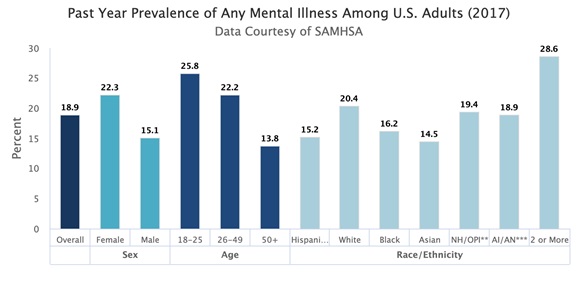
One in Five Adults Have a Mental Illness, Yet Workplaces Still Stigmatize
Everyone is affected by mental health: you either deal with a mental illness, or you know someone who does. Even though many adults suffer from mental illnesses, they still feel stigmatized and unsupported in the workplace.
Workplaces are full of stress, busyness, and responsibility, and these are compounded by people’s personal lives and concerns. Life can be overbearing sometimes, and the reality of the fact is, a lot of people deal with mental health issues every day. And if that’s not difficult enough, most workplaces are not helping employees deal with their mental health.
According to the National Institute of Mental Health (NAMI), nearly one in five adults in the U.S. lives with a mental illness. October 10, 2019 was World Mental Health Day, and many people were eager to talk about the overall importance of mental health de-stigmatization and awareness.
This applies to workplaces.
The Numbers Are Undeniable
Of U.S. adults over 18 years old, a reported 18.9 percent experience mental illness—and this just goes for those reported. Mental illness is most common in younger adults between the ages of 18 and 25 with 25.8 percent reporting psychiatric struggles. But even for those 50 years and older, the rate is as high as 13.8 percent, reports NAMI.

Really, denying its existence is simply not an option. Mental illness in the workplace is very much real. Still, even though mental illness is common for U.S. adults, the right discussions are not being had. Tens of millions of people worldwide do not feel that they can open up about their struggles in the workplace to colleagues, employers, or supervisors.
“Stigma in the workplace is still, unfortunately, an issue,” says David Ballard, senior director of the American Psychological Association’s Office of Applied Psychology, and director of its Psychologically Health Workplace Program.
What’s Missing?
Well for one, those who struggle with mental health concerns do not feel comfortable disclosing them. They often fear that colleagues and supervisors will judge them negatively. They fear being passed over for promotions and desirable assignments and being viewed as less competent, explains Ballard. They may also have concerns about being bullied, gossiped about, or otherwise socially excluded.
How Do We Fix This?
Conversations matter. Yes, progress is being made, and things are better than they were decades ago. But the issue still persists—and people don’t talk about it with the right approach, if at all.
“Mental health is one of those issues that we usually just don’t talk about. It’s something that is very private.” Ballard added. “When mental health does get talked about, it’s often siloed off, and we talk about it like it’s separate from all of our other health issues and functioning issues.”
Organizations can start by regarding mental health as a part of a bigger picture of employee health. They can make it a regular part of performance-related conversations, Ballard said.
Programs need to be in place. Simply put: the moves have to be bigger. They have to go deeper than just talking about mental health. Organizations should have solid employee assistance programs that help employees deal with big personal challenges including financial, relationship, and caregiving stresses. These programs are particularly effective when employees can use them anonymously without fear of discrimination.
The Americans with Disabilities Act (ADA) and Family Medical Leave Act (FMLA) can both be used for mental health problems, too. Both have restrictions, and state laws may vary. However, the ADA specifically requires that employers make reasonable accommodations for disabilities in the workplace. This can include things like flexible schedules, time off for therapy or doctor appointments, support animals, a place where an employee can be alone for a minute, and other things.
These accommodations are meant to be a negotiation between employee and employer. However, it’s important to listen to the needs of the employee so the individual can do his or her job well and in health. FMLA covers time off, and this includes mental health care and therapy.
You would think employees would be taking advantage of these federal regulations already. But, a Mental Health America survey of nearly 10,000 employees found that 55 percent said they were afraid of taking a day off work to attend to their mental health. Plus, even after taking a day to recharge and restore a level of functioning, the key to remaining successful is maintaining balance when you get back, said Ballard. As the work piles up, the benefits of a break can quickly diminish.
Higher ups matter too. Beyond starting the right conversations and ensuring the best programs are in place, a shift in company culture is imperative to fully help employees. Employees need to be comfortable in their relationships with their bosses and supervisors, Ballard said. Employers need to work with supervisors to train them in the best way to help employees who need support.
What do we know?
Well, we know that many adults suffer from mental illness. We also know most people don’t feel comfortable or supported in the workplace to deal with these mental health issues. However, we also know that part of the stigmatization behind mental health comes from negative myths surrounding the issue. An Inc. article outlines fact and fiction for us:
Myth: Individuals with mental health conditions cannot work or function in stressful or demanding jobs.
Fact: Many individuals with psychiatric disabilities can and do work effectively under pressure. The impacts of work and life pressures vary, and no two cases are the same.
Myth: Individuals with mental health conditions pose a danger to others in the workplace.
Fact: Despite what some headlines suggest, there is no evidence that individuals with mental health conditions post a danger to society. In fact, people with psychiatric disabilities are far more likely to be victims than perpetrators of violence.
Myth: Individuals with mental health conditions cannot work until they are completely recovered.
Fact: Workplace accommodations enable many people with psychiatric disabilities to work effectively and happily with their disability.
The article also gives important tips of how colleagues and peers can help people struggling not by being a therapist, but by referring them to the right people. It’s important to take time and listen to others, but do not to try and treat or diagnose them if you aren’t a licensed professional.
Mental health is a reality for many people, and there are so many ways employers can make workplaces healthy and supportive. If you or someone you know is having mental health issues, resources are available at Mental Health America. Or you can call 1-800-273-8255, a 24-hour crisis center.
Let’s help others not because we have to by law, but because it’s right thing to do.